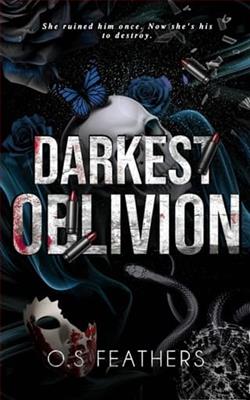Page 8 of The Deadly Candies
Kathy sighed. “I’m close. In Alabama now. I will be in Butts in a few hours, they say,” said Kathy through her sobs.
“I went to find Matteo. To ask for help. He cursed me. Called me a name in Italian in front of everyone. I hate his guts! I think he’s the one that told on you and Carmelo. It’s not fair. You two did nothing wrong. Carmelo is the sweetest boy. He loves you Kathy. It’s evil what they’re doing! I hate Daddy and Uncle Henry for this! I hate them!”
“Debbie, don’t say that. You don’t mean it,” Kathy wept.
“I do! I swear I do! Why would God let this happen?” Debbie broke down sobbing hard.
“I’m sorry, Matteo did that to you,” Kathy summoned enough of her composure to speak. “Don’t go around him. Stay away from the Italians. I don’t want you to get in trouble like me. It’s okay. I’m safe. I’m okay.”
“I don’t know what happened to Carmelo. I don’t know anyone who could tell me. I heard Bumpy say outside the bakery that the boy was gone. What does that mean? Do you think they killed him? Or what?”
The news was a like bullet hole to her chest. Kathy choked on her tears.
“I know Papa and your daddy are angry at the Italians. And your daddy is cursing Bumpy Johnson, too, in public. Things aren’t good, Kathy, with you gone. Your mama and daddy won’t stay in the same room with each other. And Mom and Dad fight now. I hear her crying in the night and daddy yelling. Brother doesn’t come home now. He stay in the streets. Everybody is hurting. We scared for you, Kathy,” Debbie sniffed.
Kathy wiped her tears. “Don’t be scared. I’m fine. And this trouble we have won’t always last. I promise you that. Daddy will calm down. Harlem will calm down, and I’ll be home before Christmas. Carmelo is fine. I would know if he was hurt. I would feel it in my heart.”
“I pray so,” said Debbie weakly.
“Look, on Sundays, I will be calling. After church, you go home with Mama, and I will talk to you both. We have already written to each other. I’ve already written you two letters on the road. I’ve seen so many things and met different people, too. It’s not that bad,” Kathy said, trying to sound brave.
“Okay,” Debbie whimpered.
Buddy tapped on the payphone door. He pointed to the bus that was now loaded with people.
“I got to go. I’m on an all-colored bus now. Talk to you on Sunday! Promise!”
“Promise,” Debbie said sadly. “Love you.”
“With all my heart. I love you,” said Kathy.
She hung up and left the phone booth. Buddy smiled. They started back to the bus.
“So, you went to war?” she asked.
“Yep, had my gun on the Germans. Now we’re back, and no one cares,” Buddy mumbled.
“I care,” Kathy smiled.
“You sweet kid,” Buddy winked. “Get on the bus, stay close to me until we reach Mississippi. A lot of little stops, and we may encounter police patrols. So don’t say anything, just be mindful.”
Kathy nodded as she boarded the bus, her sob still lodged in her throat. Again, she touched Carmelo’s ring, believing in them and in the magic of the world that made Carmelo hers. The time they spent in the attic and then at Mama Stewart’s made her determined not to lose faith.
5
ADream – Queens, New York 1949
The sea whispered outside the cottage, its salt-kissed breeze fluttering through the open windows like a benediction. Sicily stretched before them—a patchwork of sun-bleached cliffs and olive groves, the Tyrrhenian Sea a molten sapphire under the September sun.
The cottage, perched on the edge of a nameless village near Palermo, was a relic of another time: limestone walls weathered to the color of cream, terracotta tiles cracked but stubborn, and a garden overrun with rosemary and wild jasmine. Carmelo had chosen it for its solitude, for the way the light pooled in the courtyard like liquid gold at dusk. Here, far from his father’s shadow, the world felt reborn.
It was a dream world that he created for them.
Kathy stood in the center of the room, her wedding dress glowing like moonlight spun into fabric. It was simple, yet to Carmelo, it was a masterpiece—a cascade of ivory lace that clung to her waist before drifting in soft folds to the floor. The neckline framed her collarbones, delicate as bird wings, and the sleeves ended in scalloped edges that fluttered when she moved. Her hair, freed from its pins, was a crown of midnight curls, each coil defiant and alive, catching the sun like filaments of black silk. She was a paradox: a Harlem rose blooming in Sicilian soil, her skin the rich brown of cinnamon bark, her eyes the warm amber of aged whisky. To Carmelo, she was Persephone unchained, a goddess who had chosenhim, a sinner’s son, as her mortal consort.
“I do,” she said.
“I do,” he said.















